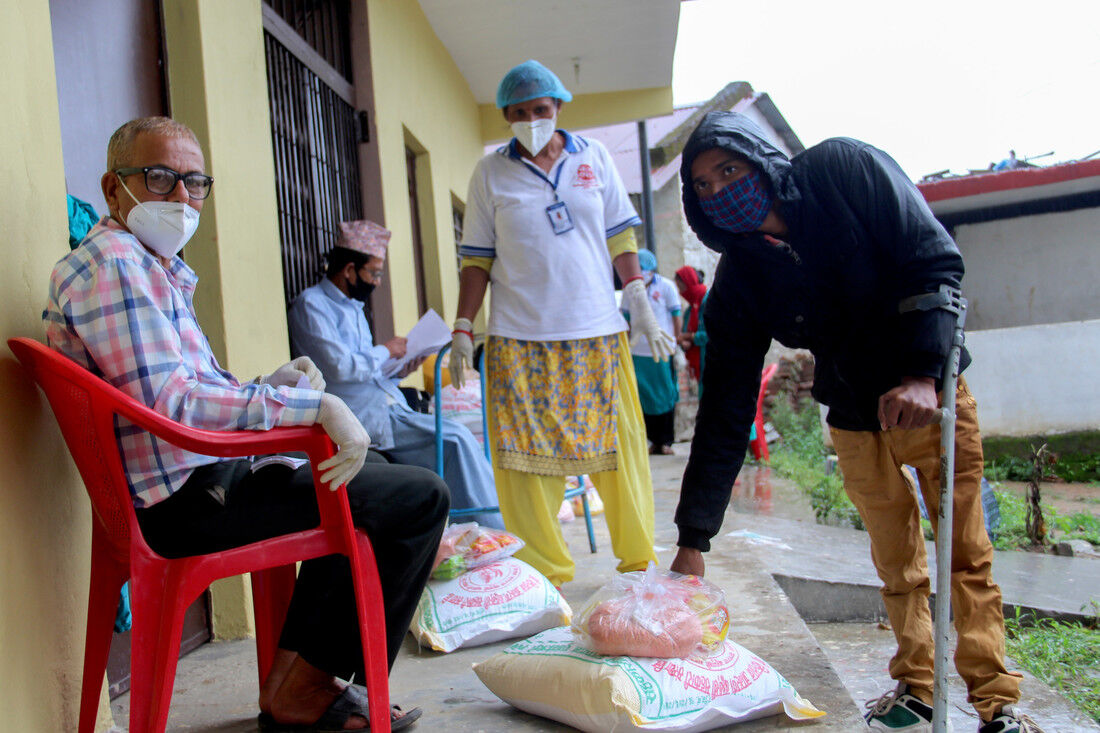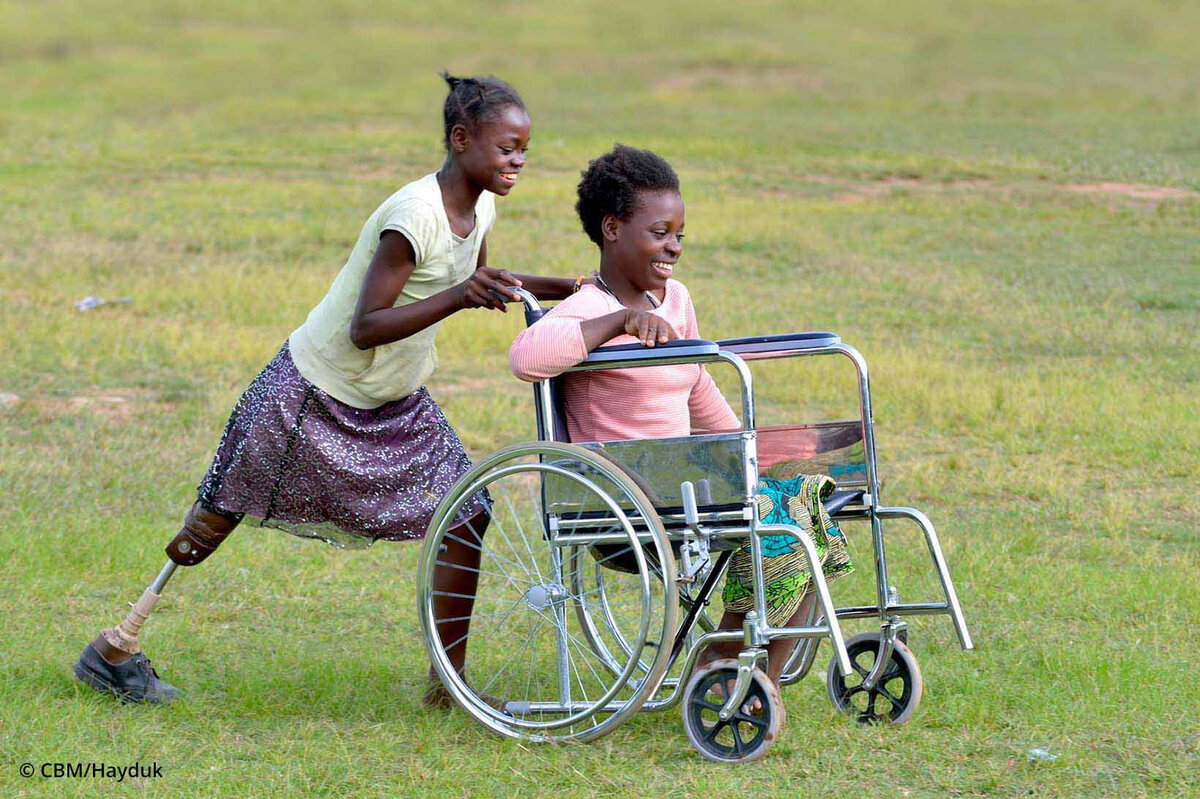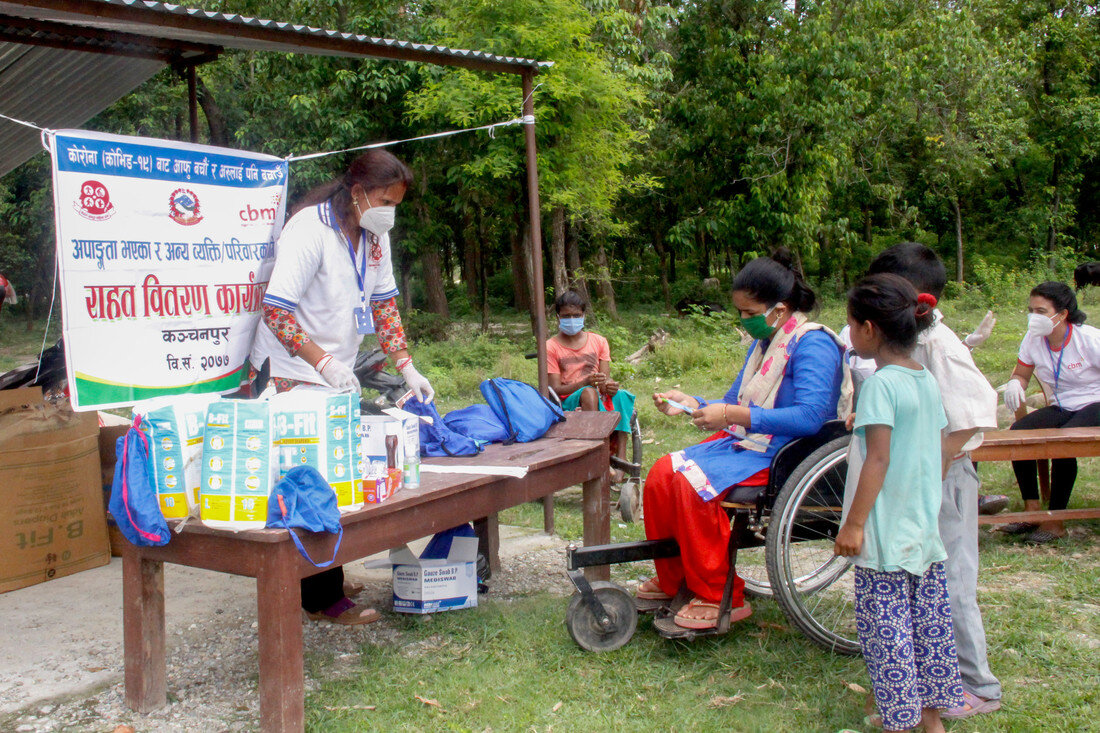- Exchange and Networking
- Knowledge and Learning
- Advocacy
- Our topics
By Anja Herde, Denis Hofer and Mark Schmid
Even in normal times persons with disabilities are confronted with exclusion, higher rates of poverty and neglected rights to full participation. The COVID-19 pandemic has increased the gap. Key actions and learnings from COVID-19 responses can contribute to more inclusive crisis response. Longer term disability inclusive development efforts have the potential to increase the resilience against shocks for persons with disabilities and groups at risk of being left behind.

Over 1 billion persons worldwide, that’s about 15 percent, live with some sort of disability because of sensory, physical, mental or intellectual impairments. If family members of persons with disabilities are taken into account, disability affects up to 25% of the world’s population (UNDP 2003).
Due to various barriers persons with disabilities are less likely to access education, healthcare and livelihoods or to participate in the community. Especially in development countries and in humanitarian contexts persons with disabilities have a higher risk to be excluded and are not able to break out of the cycle of poverty and disability. Poor people get sick more often because of their diet and low hygiene standards. In case of illness, they often cannot afford medical treatment. This increases the risk of disability. And disability increases the risk of becoming poor: persons with disabilities have higher costs of living and less opportunities to get educated and employed (Australian Disability+Development Consortium).
Persons with disabilities face a range of barriers in their daily lives hindering them to fully participate and being involved in society. Barriers often include inaccessible information and infrastructure, attitudes of service providers and financial costs. Inclusion means, that everyone, regardless of disabilities, gender, culture, age etc. has the right to “fully and effectively participate in society on an equal basis with others” (CRPD 2006).
The COVID-19 pandemic has accentuated the cycle of poverty and disability and increased the barriers to full participation.
Findings of surveys show that the COVID-19 crisis has deepened the marginalisation of persons with disabilities: They are disproportionately affected by the pandemic in all areas of life, through barriers and poverty, accessing education and livelihoods, reduced physical and social mobility, reduced care and support services, relief distribution and increased violence and abuse (Australian Aid 2021). Be aware that pre-existing health conditions make people more vulnerable to COVID-19 and other infectious diseases.
Children with disabilities did not have equal access to education when schools switched to remote learning, where extra support was not available. Persons with disabilities report a significant reduction in employment and income generation from independent work because of the pandemic restrictions. In the context of health care, persons with disabilities face more difficulties to receive regular care support and medication they depend on. Furthermore, inaccessible public health information makes it difficult for persons with disabilities to access suitable health services and treatments for COVID-19. Such discriminating circumstances and neglect lead to a higher risk to contract the virus and to a higher death rate (Office for National Statistics 2020). In addition, persons with disabilities face increased stress, anxiety and isolation from lockdown measures and physical distance as virtual social activities are not accessible for them. Last but not least, there are reports of abuse and higher security risks particularly for women and children with disabilities.
"Inclusion means, that everyone, regardless of disabilities, gender, culture, age etc. has the right to “fully and effectively participate in society on an equal basis with others."
Governmental institutions and international NGOs missed out reducing barriers for persons with disabilities and addressing their needs. Persons with disabilities are not included in planning and decision making of many COVID-19 responses or recovery measures. And the pandemic restrictions make it even harder for OPDs (Organizations of persons with disabilities) to reach out to their peers for help (International Disability Alliance - IDA 2020).

The following key messages are based on CBM Global’s (CBM Global Disability Inclusion) own experience in disability inclusive development and humanitarian action and enriched through evidence and best practices of numerous actors such as the International Disability Alliance (IDA- COVID-19 and the disability movement):
Any COVID-19 programme response must be inclusive of persons with disabilities: Inclusive programming starts with a sound (baseline) analysis and participatory Project Cycle Management (PCM) processes. Collaboration with OPDs from the beginning is crucial. While ensuring participation, intersectionality and diversity must be respected. OPD involvement can be complemented by collaborating with other grass roots organisations or other self-advocates.
COVID-19 related and health risk communication must be accessible: Information, sensitisation and interventions need to be understood by everyone. This includes plain text and easy read messages on mass media and the internet, captioning and sign language, pictograms, large print and high contrast. Ideally, OPDs and/or self-advocates are themselves involved in communication activities and use a variety of communication methods.
COVID-19 and health related interventions must be physically accessible: Access to health or supporting channels (e.g. food or cash distribution) need to be ensured for everyone (e.g. elderly persons might need seating options or shadow while queuing). Furthermore, consider accessible transportation (personal assistants need to pay their rides, too; wheelchair users cannot use motorcycle taxis). Health personnel must be trained to receive persons with disabilities and to identify individual treatment needs.
"Persons with disabilities are not included in planning and decision making of many COVID-19 responses or recovery measures."
Disaggregate data, e.g. when running vaccination programmes: Data collection has to be disaggregated by gender, age and disability. Use the Washington Group short set of questions or integrate the questions into your own data collection systems. Vaccination programmes need to prioritise persons with disabilities amongst the most vulnerable group.
Support regional or national OPD federations in their advocacy for disability-inclusive response: This includes advocacy in cluster systems and other national networks.
Make sure mental health & psychosocial support is provided to your staff and to users of services: Anxiety and isolation must be tackled as part of your intervention through social networks and low-threshold and accessible professional support services. Recognize reasonable accommodation for persons with psychosocial disabilities in your intervention through the collaboration with self-help groups, supporting and family networks and local professionals.
"It is insufficient to equip, train and inform OPD partners in the moment of an emergency; preparation and capacity building have to set base before."
CBM Global together with existing partners in Nepal developed a COVID-19 response concentrating on disability inclusion, mental health / psychosocial support and basic needs assistance. Disability inclusiveness targeted government units and key actors to take into account accessibility in health, social care and humanitarian assistance and to respond to particular needs and rights of persons with disabilities. The response included activities to deliver accessible and inclusive health messages. At-risk households were supported with basic needs assistance, and individual tele-mental health and psychosocial counselling service was offered. Advocacy for inclusive COVID-19 response was led by the CBM partner National Federation of the Disabled – Nepal NFDN and incorporated interventions with emergency clusters, contributions of evidence, technical support, representation of persons with disabilities and capacity building of local OPDs and health personnel. One of the advocacy outcomes was that the Ministry of Health and Population endorsed a National Guideline for Disability Inclusive Health Services and an Interim Guidance for the Health-related Rehabilitation and Physiotherapy of Person with COVID-19.
"Disability inclusiveness targeted government units and key actors to take into account accessibility in health, social care and humanitarian assistance and to respond to particular needs and rights of persons with disabilities."
Important learnings were identified in the reflection on the response with the NGO and OPD partners: it is insufficient to equip, train and inform OPD partners in the moment of an emergency; preparation and capacity building have to set base before. Local context information is important for the development of Information, Education and Communication IEC materials for awareness-raising on disability inclusive response. Diverse workforce is instrumental to reach the desirable achievements in inclusiveness. The joint effort of a Real Time Evaluation together with partners and OPD representatives during the implementation of the response helped to adapt the response to the detected challenges.

Over the period of 10 years, CBM has supported the build-up of a livelihood-centred self-help movement in the marginalized rural areas of Madhya Pradesh, India, with the partner Naman Sewa Samiti. Persons with disabilities take the role of mobilizers and trainers of the groups. Parallel to the endline study of the project, CBM commissioned a study on distress and resilience in the COVID-19 situation (Mohammad Ahtesham 2021). One part compared communities in the intervention areas with non-intervention areas. Significant advantages have been detected in the knowledge about risk-factors and COVID-19 appropriate behaviour. The study indicates that participants from the intervention area have found better access to healthcare and medical aid, Government schemes and food/grain packets. Participation in self-help groups has fostered various forms of empowerment and created connections to existing support systems and local governance structures. There is a significant difference in the way self-help group members respond and cope with the pandemic. The self-help groups have shown the potential to provide a safety net. Beyond the livelihood dimension, psycho-social support shared among group members fosters the resilience.
The study results confirm the approach of the CBM preferred community based inclusive development approach as a mean to strengthen resilience against unexpected hardship.